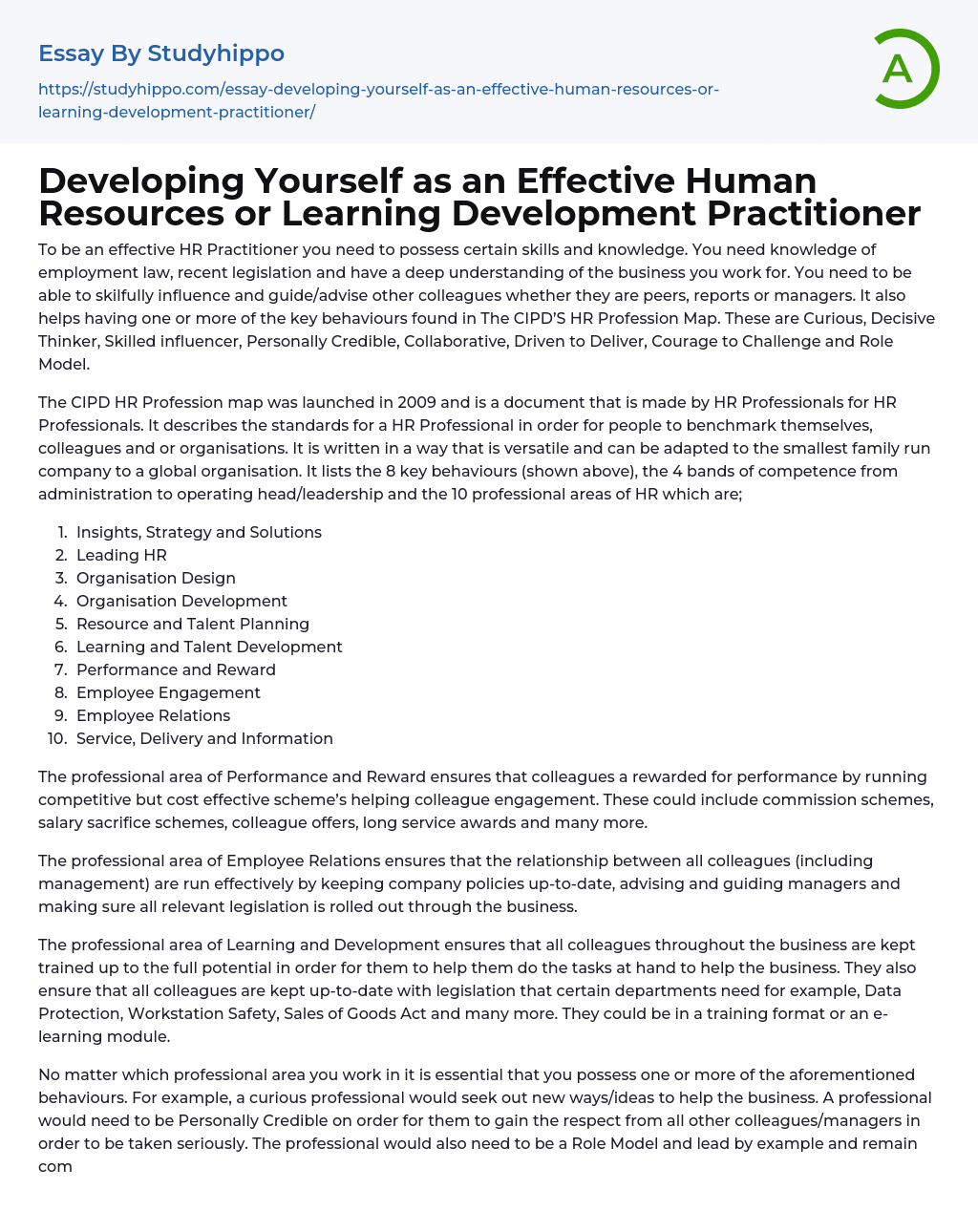

Essential Skills and Knowledge for Effective HR Practitioners
As an effective HR Practitioner, possessing certain skills and knowledge is crucial. This includes understanding employment law, staying updated on recent legislation, and having deep insight into the business you work for. Additionally, being able to skillfully influence and guide colleagues, whether they are peers, reports, or managers, is essential. It is also beneficial to possess one or more of the key behaviors outlined in The CIPD’S HR Profession Map. These behaviors include being curious, a decisive thinker, a skilled influencer, personally credible, collaborative, driven to deliver, courageous to challenge, and a role model.
The CIPD HR Profession map, launched in 2009, is a document created by HR Professionals for HR Professionals. Its purpose is to establish standards for HR Professionals to serve as benchmarks for individuals, colleagues, and organizations. The document is designed to be adaptable, suitable for both small family-run companies and large global
...organizations. It outlines 8 key behaviors, 4 bands of competence ranging from administration to operating head/leadership, and 10 professional areas of HR.
- Insights, Strategy and Solutions
- Leading HR
- Organisation Design
- Organisation Development
- Resource and Talent Planning
- Learning and Talent Development
- Performance and Reward
- Employee Engagement
- Employee Relations
- Service, Delivery and Information
The Performance and Reward field ensures that colleagues are rewarded for their performance by implementing competitive yet cost-effective schemes. This includes commission schemes, salary sacrifice schemes, colleague offers, long service awards, and
various other incentives.
The Employee Relations field is responsible for ensuring the effective management of relationships among all colleagues, including management. This is achieved through updating company policies, providing advice and guidance to managers, and implementing important legislation throughout the organization.
The learning and development department is responsible for ensuring that all colleagues in the business are well-trained and capable of performing their tasks effectively. This includes keeping colleagues up-to-date with important legislation such as Data Protection, Workstation Safety, and Sales of Goods Act. Training can be conducted in various formats, including both traditional training sessions and e-learning modules.
Regardless of the professional field you work in, it is important to possess one or more of the mentioned behaviors. For example, a curious professional would actively seek new ideas or approaches to benefit the business. It is also crucial for a professional to be Personally Credible in order to earn respect from colleagues and managers and be taken seriously. Additionally, they should serve as a Role Model by leading through their own actions and remaining unbiased while looking out for the company and colleagues' best interests. These behaviors are just a few among the 8 mentioned in the CIPD HR Profession Map, each equally important. It is also essential to avoid complacency because the HR profession constantly evolves with new legislation and changes. This is why Continuous Professional Development (CPD) is necessary; it ensures continuous learning and striving for personal growth to always perform at one's best. Companies worldwide now recognize CPD as a way of demonstrating dedication to one's career for prospective employers.
- Academia essays
- Higher Education essays
- Language Learning essays
- Studying Business essays
- Education System essays
- Study essays
- First Day of School essays
- Scholarship essays
- Pedagogy essays
- Curriculum essays
- Coursework essays
- Studying Abroad essays
- Philosophy of Education essays
- Purpose of Education essays
- Brainstorming essays
- Educational Goals essays
- Importance Of College Education essays
- Brown V Board of Education essays
- The Importance Of Higher Education essays
- Online Education Vs Traditional Education essays
- Academic And Career Goals essays
- Academic Integrity essays
- Brown Vs Board Of Education essays
- Distance learning essays
- Technology in Education essays
- Vocabulary essays
- Writing Experience essays
- Importance of Education essays
- Early Childhood Education essays
- Academic Degree essays
- Academic Dishonesty essays
- School Uniform essays
- Academic writing essays
- Cheating essays
- Bachelor's Degree essays
- MBA essays
- College Life essays
- Grade essays
- Diploma essays
- Phonology essays
- Sentence essays
- Filipino Language essays
- Pragmatics essays
- Millennium Development Goals essays
- History Of Education essays
- Graduate School essays
- Middle School essays
- School essays
- Special Education essays
- University essays



